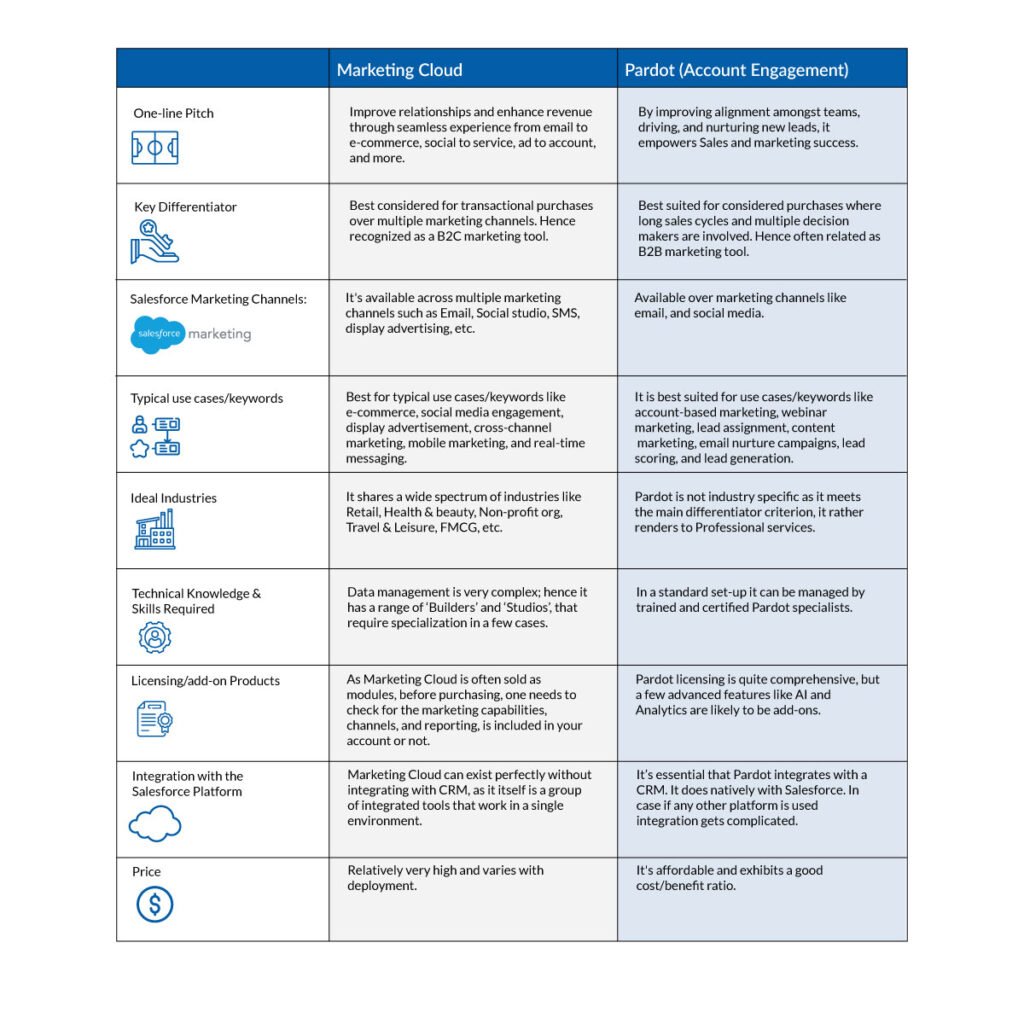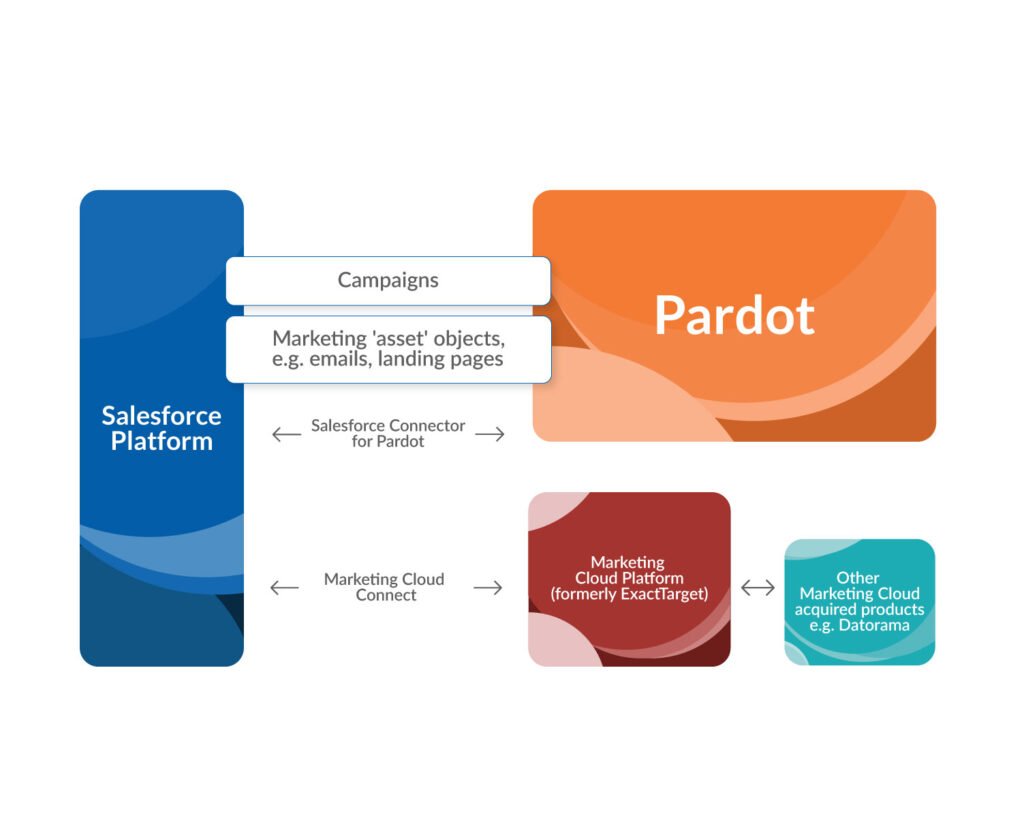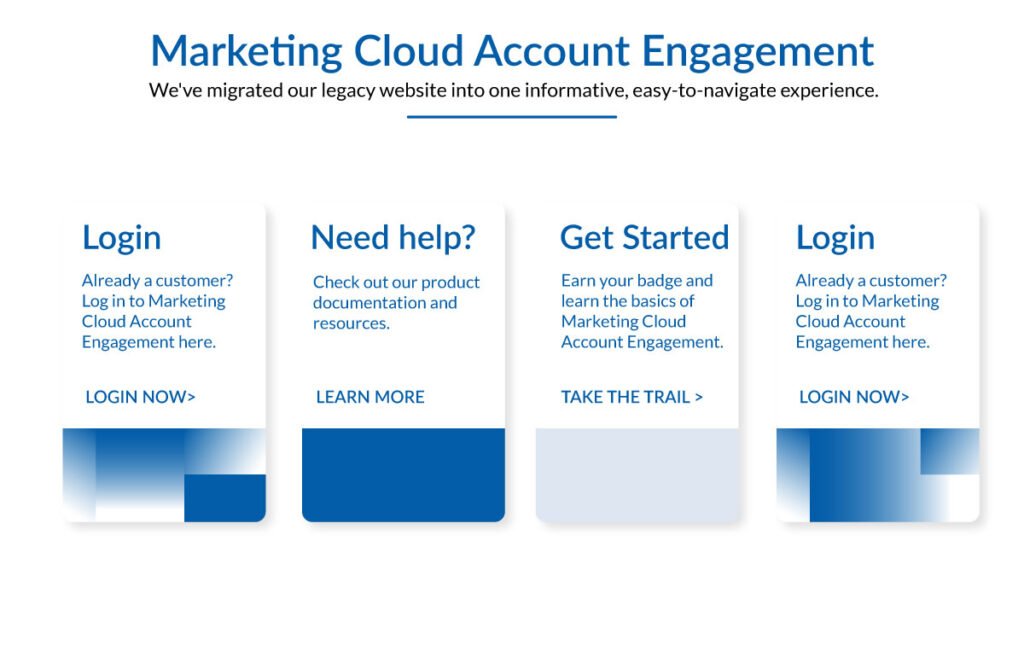Choose wisely to fit your business needs!
Introduction
As the industrial development strategy has evolved striking change, taking a step forward to invest in marketing automation is the right decision. Production fades in the background with an oversaturated market, hence the key factor is to meet the ever-changing business needs.
Coming to customer engagement, choosing the right tool is always a difficult task. Are you new to the world of marketing automation? We got the answer clear for you…. Are you a B2B or a B2C company? Salesforce got everything covered with Marketing cloud (SFMC) & Pardot.
This article helps you understand the importance of Salesforces tools of two marketing automation solutions. Once you are done reading through the article you will surely make a wise decision in choosing the right solution to meet your business needs.
Research shows that many marketing automation tools are available but natively to Salesforce there are two options: Marketing Cloud & Pardot. But how are they different? Though they are distinct, both have certain similarities on the surface, and to add to the confusion Pardot is renamed as “Marketing Cloud Account Engagement” in the year 2022.
I know it’s confusing, but you are not alone. There are quite many questions that people might frequently ask:
- Does Marketing Cloud and Pardot perform similarly?
- Does Pardot form a part of the Marketing Cloud?
- Are either of the tools the dummy version of the other?
The answers to all the above questions are a big NO.
So, what are the differences between the two Cloud tools? Here, I’m going to help you compare the two tools, debunk the myths; and enable you with some questions handy so that you can ask yourself and conclude. You can find a functionality breakdown in this article.
Key Differences between the Marketing Cloud & Pardot (Marketing Cloud Account Engagement)
Before digging deeper, ask a few questions that can guide you select the right tool,
Is your business B2B or B2C?
How much information do you have about your potential customers?
How big is the size of your company?
How are your sales cycles?
How do you close your deals, in store, on websites, or sales teams?
Which communication channels do you approach to cover your marketing strategy?
Do you have a Salesforce CRM platform?
Now, with the answers to the above questions in your mind everything will be easy.
The quick response to the questions is that Marketing Cloud is considered for B2C marketing, and Pardot (Account Engagement) is suitable for B2B, but not exclusively.
Marketing Cloud is most suitable for all transactional purchases across multiple marketing channels, and Pardot (Account Engagement) is suitable for considerable purchases where long sales cycles and multiple decision makers are involved. Soon you will come across a few examples of B2C organizations making considered purchases, and B2B organizations making transactional purchases.
Differentiation Breakdown of Marketing Cloud Vs Pardot (Account Engagement)

Functionality of Marketing Cloud Vs Pardot
Debunking myths and frequently asked questions: Does Pardot fall as a part of the Marketing Cloud?
Again, answer depends on how you take the phrase that says, “Part of”, that means either…
- built on the same product architecture or
- marketed with the same brand identity.
Built on the same product architecture: The first case that is the same product architecture is ruled out, as the answer is a big No, as Pardot is partly built on the core Salesforce platform, and partly on its own platform. Marketing Cloud exists on its own platform and not on the core Salesforce platform.
Though Pardot is renamed as Marketing Cloud Account Engagement, it doesn’t either function together, or sold together.

Marketed with the same brand identity: for this the answer is Yes, as Pardot is namely under the umbrella of Marketing Cloud brand.
Initially Pardot was independent, later it transitioned aligning with Sales Cloud, and in the year 2022 it’s under the umbrella of Marketing Cloud brand renamed as “Marketing Cloud Account Engagement powered by Pardot.”

Functionality Breakdown Matrix
Though the breakdown below shows the matrix with boxes each platform ticks, remember this is limited information about the tools. Explore more on which add-on products of Marketing Cloud are compatible with Pardot. Pardot seems to be having gaps with marketing channels, as it focuses more on Salesforce object connection and data sync.


*Social and Marketing Clouds social media listening product is scheduled for retirement
Features of Marketing Cloud & Pardot
Marketing Cloud
- Campaign management in Salesforce Marketing Cloud enables to create a personalized customer journey. The journey builder helps you set up multichannel adaptive journeys with user friendly drag and drop tools. Possible activities vary from follow-up email or push notification depending on your customers made a purchase ensuring they return for another service.
- The omnichannel communication adds personalization to each touchpoint. 72% of the customers say they only engage with personalized and consistent messaging. Marketing Cloud orchestrates messages through channels such as Email Studio, Mobile Studio, Advertising Studio, and Social Studio.
- A/B Testing is a market testing method in which you send two versions of your Marketing Cloud Email Studio communication to two test audiences from your subscriber list. Track which version receives the highest unique open rate or highest click-through rate and send that version to all remaining subscribers.
- IP warming in Salesforce is the best feature used in Marketing Cloud Email Studio. Inbox service providers (ISP) are suspicious of mail received from IP addresses lacking history. As a result, ISPs and webmail providers recommend that you warm or ramp up your new IP address by building up its sending reputation.
- With behavior tracking this tool tailors your content to customer’s intent in real-time. There are many touch points that your customers engage with your brand such as web pages, apps, physical, stores, etc. The interaction studio helps you gain insights through forms, emails, or the history of their purchase. It has powerful AI capabilities that understands customers’ intent.
- Marketing Cloud analytics measures the ROI of all your marketing activities. It helps you bring together the data across all integrated sources to present it in a single-view dashboard for smarter forecasting. It provides you with built-in and custom API connectors for more than 100 platforms.
- Marketing Cloud connect integrates SFMC with Sales or Service Clouds. It’s easily configurable, and the outcomes include better data management, unified customer view across all departments, and synchronized efforts. Integration with 3rd party applications can help you access data from various sources and fit any of your business goals. These can be project management apps in Salesforce, marketing tools, or analytical products.
Pardot
- The primary channel that Pardot handles is Email marketing. It handles emails by combining all the data points that segment the database in line with the prospect behavior, prospect’s firmographic data and what’s happening in your CRM and then send emails if relevant.
- As email marketing forms a major part of marketing strategy, it’s important to improve and optimize your Pardot emails with A/B testing functionality. Pardot creates two versions of emails that will be sent to a portion of your list and based on the email’s engagement data it determines the winning version of the email and sends that mail to the remaining audience.
- Using Pardot’s landing page builder you can build aesthetically pleasing pages. You can work on existing templates and create your own templates or even build one-off landing pages as well. The landing page and progressive forms builder are special features of Pardot, as they automatically adjust forms to collect information that’s missing from the lead’s profile.
- Pardot is featured with search tracking and optimization, you can integrate search engine marketing attribution measures that help marketers quantify ROI on general and campaign specific SEO efforts. These measures are critical to monitor the health and actual ROI being realized through organic search and inbound marketing efforts.
- The journey builder puts automation in Pardot’s marketing automation capabilities. It helps build and guide your leads in the most optimal digital marketing path and helps convert and purchase.
- It’s no surprise that Pardot boasts a robust lead management feature set. You can capitalize on lead tracking, scoring, nurturing, personalization, and more. You can build profiles for individual leads and track their interactions with your sales/marketing teams. Automate lead behaviors and engagements with your site, use lead scoring capabilities to prioritize leads and set thresholds.
- Pardot provides deep and accurate analytics and attribution tools. You can use these attribution tools to tie closed leads to the specific campaign and marketing efforts that brought them in, enabling you to analyze messaging, marketing channels, digital advertising, conversion tactics, and more.
- All the information and behavior-gathering as well as the lead-scoring tools unlock critical personalization capabilities. It’s enabled to set alerts and scoring thresholds that trigger automatic but personalized messaging to continue moving leads further down the funnel toward purchase.
To summarize we can say that the time required to learn Marketing Cloud is very high in comparison to Pardot.
Can businesses use both tools?
Yes! Businesses can make use of both the tools together, provided one has the budget to spend! It’s generally a case where either you run out of budget, or you have budget, but you aren’t aware that you need both.
Once the use cases are identified then it’s worth considering both the solutions. But without getting carried away with fairy things, try and understand your business needs, and adapt Pardot for B2B marketing and Marketing Cloud for B2C marketing.
As I detailed earlier, do not simply consider Pardot for its less expensive, dig deeper and understand the requirement and related use cases.
Key factors to improve activity profitability.
- Team Training: collaborative learning becomes an integral part of team training. To utilize Marketing Cloud to the fullest, organizations need to invest in lengthy training processes and specialized skills. Whereas Pardot requires very less training.
- Adaptation process: Learn how to make the most out of the tool’s functions.
- Testing procedure: Test certain features to understand how they work.
- Exception lists: Better to stop sending emails to those subscribers whom you’ve contacted a week ago.
- Domain Reputation: frequently spammed emails are often blocked by Gmail. Hence to avoid blocks and spam reports, sending emails to less than 5,000 subscribers each one day helps.
What does your business need, Marketing Cloud Vs Pardot? Which is right for you?
Hopefully, the information detailed above will help you “lift the blanket of fog” and you can now see the pale sunshine to take the right direction. Ask a few below mentioned questions to yourself:
- Does your business have ‘considered purchases’ that includes long sales cycles and multiple decision makers involved?
Answer is use Pardot.
- Does your business have ‘transactional purchases’ over multiple marketing channels and e-commerce?
Answer is using Marketing Cloud.
Summary
There are many key differences between the two Marketing tools, but considering some factors like
How long are your sales cycles?
How many decision makers are involved?
What are the different marketing channels you use quite often?
Answering these questions helps you understand and clearly guides you in making wise decisions as to which tool you should use.
Still not sure? There are many Salesforce consultants out there to help you with advice as to which one you need to go with further. Try not to make any buying decisions in a rush; better get into evaluation stages of your Marketing Cloud or Pardot with a clear mind on all the factors you should consider. Think whether it’s a case of Marketing Cloud Vs Pardot, or Marketing Cloud and Pardot?
Need help? Contact our trained & certified Salesforce Consultants here.

